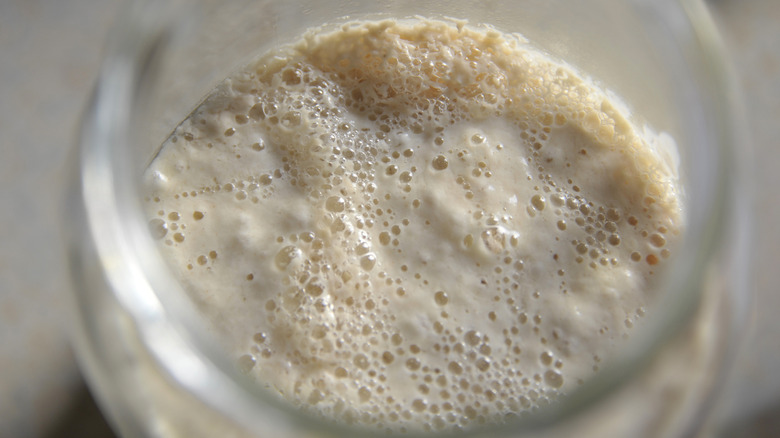What You Need To Know About Storing Sourdough Starter On The Counter
Baking sourdough bread from a starter really is a science, which can be a good or bad thing depending on your perspective. The tough part of sourdough science is that there are many factors to control. The success of your bread and how lively your starter is can be affected by time, temperature, what flour you feed it, how you handle it, and plenty of other influences. For people used to more forgiving and improvisational forms of cooking, this can be maddening. But that science also gives you control. There are plenty of tips for sourdough baking that let you adjust your dough to your precise standards. Every problem has a solution, and one of the biggest things you have direct control over is how you are going to store your starter.
Once you pick your sourdough starter recipe and have things ready to go, you can store it pretty much anywhere in your house, including just plopping the container on your counter; you just need to understand how the temperature there will affect it. Sourdough starters stored on the counter at room temperature will grow a lot faster, just like bread dough will rise faster at higher temperatures. Faster growth means your yeast is eating quicker and that means it needs to be fed more frequently. It will depend on the temperature of your house, but any starter stored on the counter will likely need to be fed every day, and sometimes as often as every 12 hours.
Sourdough starter kept at room temperature needs to be fed frequently
Sourdough starter has a whole world of yeast and bacteria (the good kind!) in it, and the more comfortable those microbes are the harder they work. Yeast's job is to feed on the sugars created by flour and water, which helps produce the carbon dioxide that makes sourdough rise, and gives it some sour flavor as well. The two factors that influence yeast's ability to do its job the most are moisture and temperature, and both can be adjusted to make your yeast work faster or slower. Yeast is strongest between 70 and 100 degrees Fahrenheit, which is why it will work so much faster when stored on your counter — at room temperature it's basically living its best life. Move it to the fridge and it will stay alive but get sluggish; there it only needs to be fed about once a week if you want to keep it active.
Whether you want to store sourdough starter on the counter will depend on your schedule. If you use it frequently it can be more convenient despite the feeding schedule, because starter stored in colder temperatures needs time and feeding to wake up before it's used. However, if you use it only a few times a week or less, the advantage of having room temperature sourdough starter ready is smaller. Either way can work, you just need to balance your starter's needs with your own and it will serve you well.

